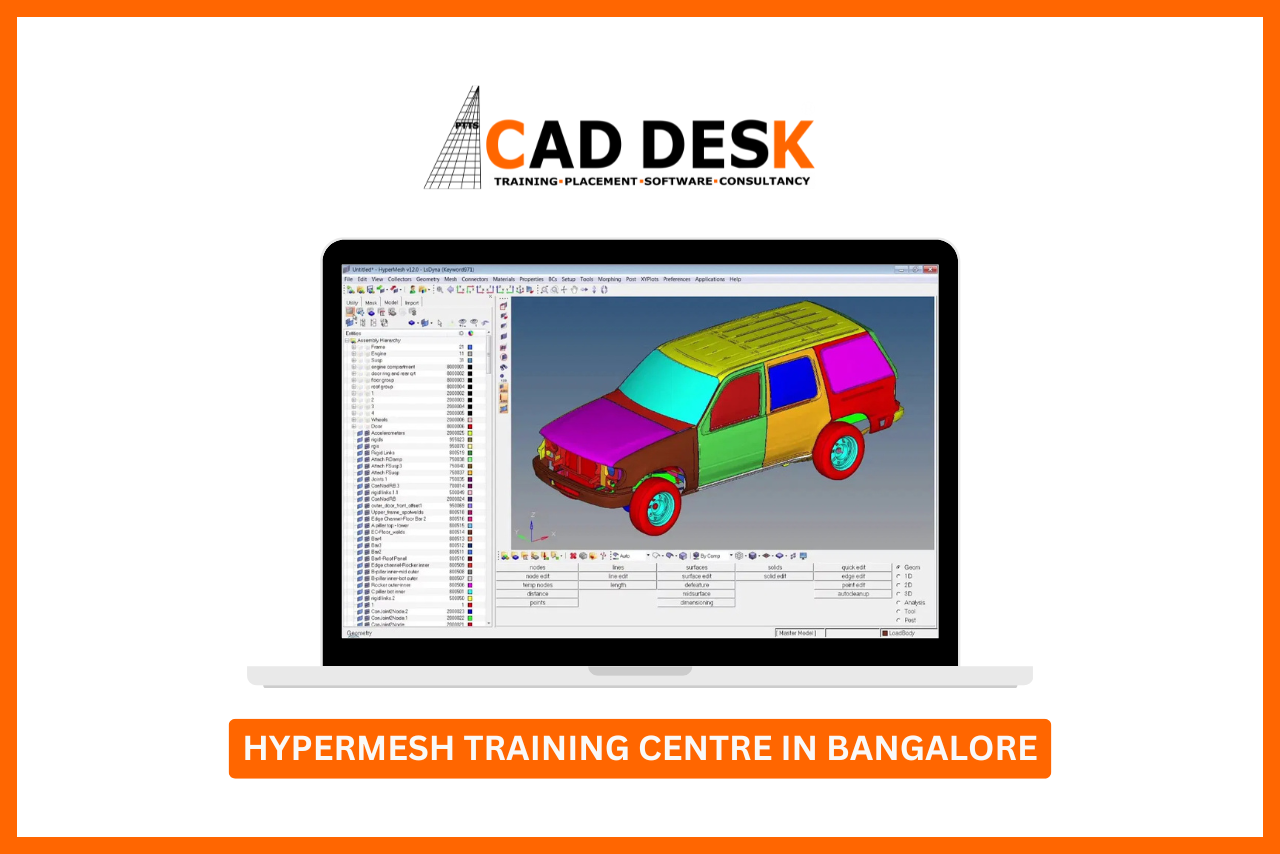
Master Your Skills In Hypermesh Course
COURSE OVERVIEW
HyperMesh is a powerful pre-processing tool for finite element analysis (FEA) developed by Altair Engineering. It is widely used in the engineering industry for creating high-quality finite element models and conducting simulations. The HyperMesh Course is designed to provide participants with a comprehensive understanding of the software, focusing on its features, capabilities, and applications in various fields. The course covers various mesh generation methods, ensuring participants can create accurate and efficient meshes for different geometries. While HyperMesh is primarily a pre-processor, the course will provide insights into the post-processing capabilities for interpreting simulation results. HyperMesh is a leading finite element analysis (FEA) pre-processing software developed by Altair Engineering. It is widely used in engineering fields for creating and preparing complex finite element models for simulation and analysis. HyperMesh provides powerful tools for creating high-quality meshes from CAD geometry, enabling users to generate both structured and unstructured meshes. The software includes tools for cleaning and simplifying CAD geometry, making it suitable for analysis. This includes removing unnecessary features, merging surfaces, and repairing geometry issues. HyperMesh allows users to define material properties and assign them to different components of the model. This includes defining elastic properties, thermal properties, and other relevant parameters for analysis. HyperMesh is an essential tool for engineers and analysts involved in finite element modeling and simulation. Its advanced features for mesh generation, geometry preparation, and integration with solvers make it a critical component of the simulation process. By using HyperMesh, engineers can enhance their ability to create accurate models, perform detailed analyses, and ultimately improve product performance and reliability. We are the best Hypermesh training Center in HSR Layout Bangalore.
CAREER OPPORTUNITIES
- Finite Element Analysis (FEA) Engineer
- CAE Engineer (Computer-Aided Engineering)
- Mechanical Engineer
- Product Design Engineer
- Structural Engineer
- Aerospace Engineer
- Automotive Engineer
- R&D Engineer
Course Highlights
CURRICULUM
- Overview of HyperMesh and its capabilities
- Understanding the user interface and navigation
- Introduction to finite element analysis (FEA) concepts
- Importing CAD models from various formats (IGES, STEP, STL, etc.)
- Geometry cleanup techniques:
- Removing unnecessary features
- Merging surfaces and repairing geometry issues
- Simplifying complex geometries for analysis
- Introduction to mesh generation:
- Types of meshes: structured, unstructured, and hybrid
- Mesh terminology and concepts
- Manual and automatic meshing tools
- Mesh quality assessment criteria (aspect ratio, skewness, etc.)
- Creating tetrahedral and hexahedral meshes
- Surface meshing techniques:
- Triangular and quadrilateral meshing
- Mesh refinement and optimization strategies
- Using mesh control options for specific regions
- Defining material properties and behavior:
- Isotropic, orthotropic, and composite materials
- Assigning material properties to components
- Creating and using material libraries
- Understanding boundary conditions:
- Fixed, pinned, and sliding supports
- Defining loads:
- Point loads, distributed loads, thermal loads, and pressure
- Setting up loading scenarios and combinations
- Overview of various solvers compatible with HyperMesh (e.g., OptiStruct, LS-DYNA)
- Preparing models for solver input:
- Setting solver-specific parameters
- Exporting models to solvers for analysis
- Introduction to multi-physics concepts
- Conducting thermal-structural analysis
- Overview of fluid-structure interactions
- Basic visualization tools for result interpretation
- Generating and interpreting contour plots and deformations
- Creating animations to visualize results

Book A Free Demo
- Course Duration : 80 Hours
- Daily : 2 Hours
- Batch Size : 20 Students
- Training Mode : Online / Offline
- Language :English
What Our Student Says
One of the best Institute for cadd training in banglore with friendly staff and good assistance is provided by manohar sir in placements
I have learn autocad course from CADDESK Marathahalli ' Good faculty nice institute There support to job also
It was a good experience in caddesk institute, the faculty is good and the teaching is good , it is must recommended training institute for architecture, interior, and engineering students
FREQUENTLY ASKED QUESTION
HyperMesh is a powerful simulation solution that redefines CAE design processes across industries with unmatched pre- and post-processing capabilities for finite element modeling.
HyperMesh includes an end-to-end model build and assembly modeling environment, going from CAD to multi-disciplinary simulation models. Dedicated workflows for parts, subsystems, and connectors facilitate representation, revision, and configuration management during the assembly and analysis process.
The first step in importing a model is to determine the format of your existing model file. HyperMesh supports a wide variety of file formats, including native CAD formats like CATIA, Creo, NX, and SOLIDWORKS. It can also import neutral file formats like STEP or IGES as well.
Meshing is a process that helps create proper elements that are computable out of irregular 3D shapes. It breaks down complex structures into shapes, such as polygons and polyhedral. Meshing is done on a CAD model using computer software.
Ensure good mesh quality by avoiding elements with poor aspect ratios, distorted shapes, or excessive skewness. HyperMesh provides various mesh quality checks and tools to identify and fix problematic elements. Use these tools to improve mesh quality and enhance the accuracy of the analysis.
Related Courses
BROWSE ONLINE RELATED COURSE

Masters In Interior & Architecture
- 450 Hours Program
- 5.0 Reviews

Masters In BIM Program
- 450 Hours Program
- 5.0 Reviews

Masters In Product Designing
- 450 Hours Program
- 5.0 Reviews
